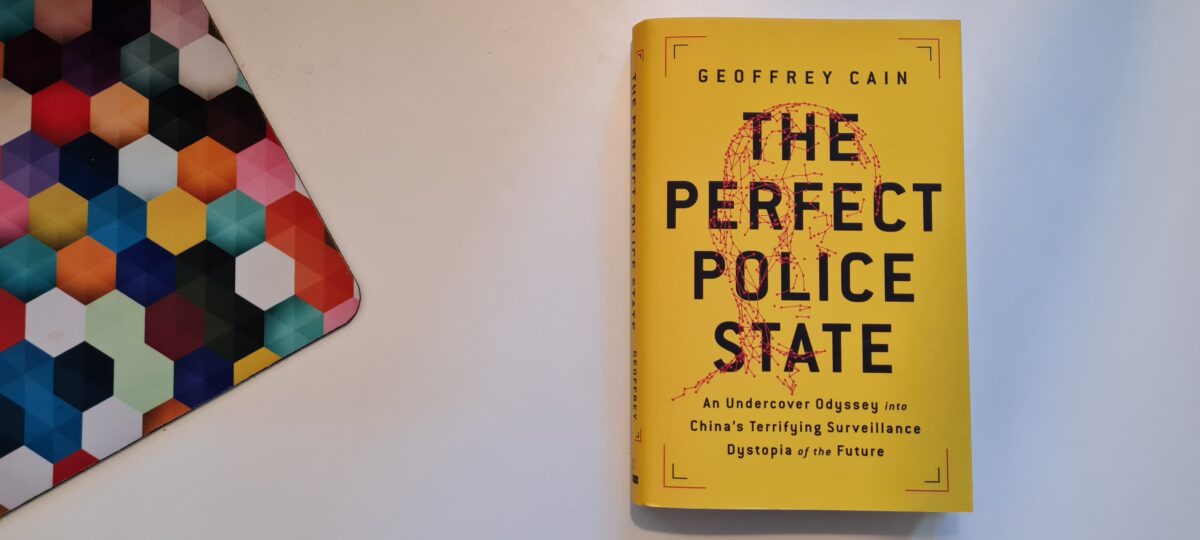This could well be a follow-up to Beijmo’s De kan inte stoppa oss. Instead of Syria as the main stage, the story and its focus is China. As Europe was an outlier in Beijmo’s book, Turkey and the US are the outliers here.
Writer Geoffrey Cain presents himself early as the journalist he is, when travelling Xinjiang in western China, though the main character in the narrative is Maysem, an Uighur who has escaped Xinjiang. Cain introduces “the Situation”, the extreme oppression of Uighurs and other minorities in Xinjiang and the equally extreme surveillance there created by the Chinese Communist party. Its war on the three evils (terrorism, separatism and extremism) has created an omnipresent surveillance like no other, a dream of predecessors like Gestapo, Stasi and the KGB, much in the form of Sky Net (yes, sounds like Terminator) and Integrated Joint Operations Platform. Purposes are reeducation (brain wash) and genocide (e.g., by sterilization) and to dismantle the entire culture by sowing distrust between every person.
Cain does a much better job than Beijmo at explaining his sources, his knowledge of things usually hidden, why he cross-checked interviewees, reasons for altering names and how he ended up covering this dire subject.
Excerpt from pages 6-7 in the book, where Cain watches heavily equipped counterterrorism officers in the city of Kashgar:
“I casually snapped a photo of the scene with my cell phone, and started to walk away. One of the police officers was wearing sunglasses with a built-in camera linked to China’s Sky Net surveillance database; the camera was connected by a wire to a minicomputer in his pocket. He turned left and glanced at me. If I were a local resident, he could probably see my name and national ID number on his lenses within seconds. Before I knew it, I was surrounded by police. I didn’t know where they came from, or how long they had been watching me. […] It’s likely that I’d been watched from the moment I arrived. Fellow journalists had warned me that my hotel room would be bugged and any laptops or smartphones I left in my room would be scanned. With 170 million cameras nationwide, some able to identify anyone from up to nine miles away, and government devices called Wi-Fi sniffers gathering data on all smartphones and computers within their range, the state probably knew a great deal about me the moment I stepped off the plane.”
This occurred in 2017, just a couple of years after Beijmo’s story. Much has happened, albeit another country, in technology. It reminds me of the planes with cameras circling Baltimore, recording every vehicle and person in the city, as told by Bloomberg in 2016.
By retelling Maysem’s story, and the stories of multiple other persons, we’re given a glimpse of the horrible oppression of the ethnic minorities in Xinjiang: reeducation centers, concentration camps, forced labor for Chinese and international corporations, the propaganda emanating from the Communist party, the male watchers allowed to sleep in female Uighurs homes and beds. Technologically, it’s on a totalitarian scale the Nazis could only have dreamed of. Despicable and omnipresent a system, the retelling is haunting, even if it’s not as blunt and violent as in Syria.
Part in the creation of the surveillance stands the technological giants of China, with an unwitting Microsoft initiating the search for ever better surveillance many years ago. Some of the tech giants are Huawei, Hikvision and Tencent, the creator and holder of WeChat.
Then, what is the actual difference technologically from our Western societies? Facebook Messenger and Alphabet/Google registering as much as they can about us on any device and with any trackers they can get hold of. Facebook with their glasses, Alphabet with their glasses and their watches. Android as an operating system with Google services installed allowing, by default, unrestrained data collection. Tech companies wish to create AI with our information and sell us as products to advertisers and corporations. In China, the Communist party wishes to create AI and control people in order to create a harmonious society without friction. The Citizen Lab released a report in 2020 named We Chat, They Watch, revealing how WeChat is used to spy on non-Chinese residents and to train AI.
Cain’s book is a good read, and the seriousness of the issue is written on every page. To follow Maysem’s story, you need to read the book, because I won’t give you any more details. Usually, I don’t bother with graphics or design, but the cover of the book (in hardcover) is appealing.
